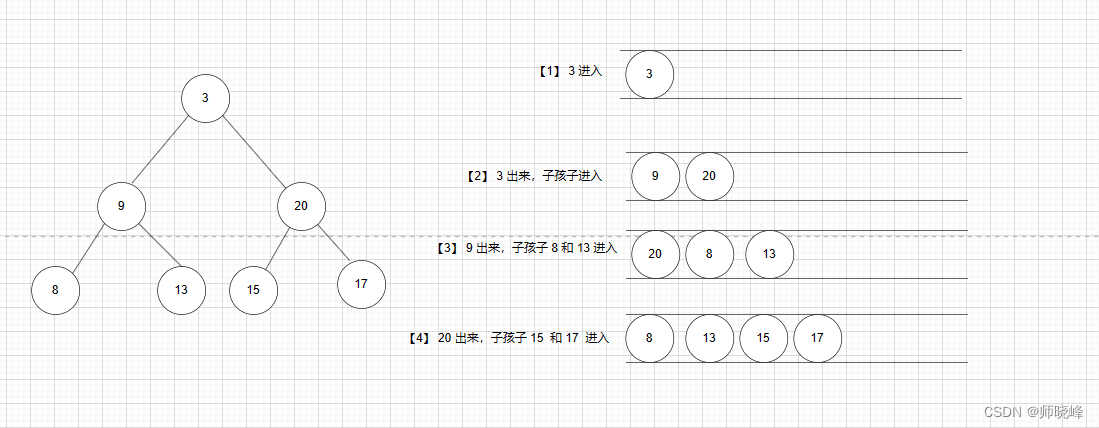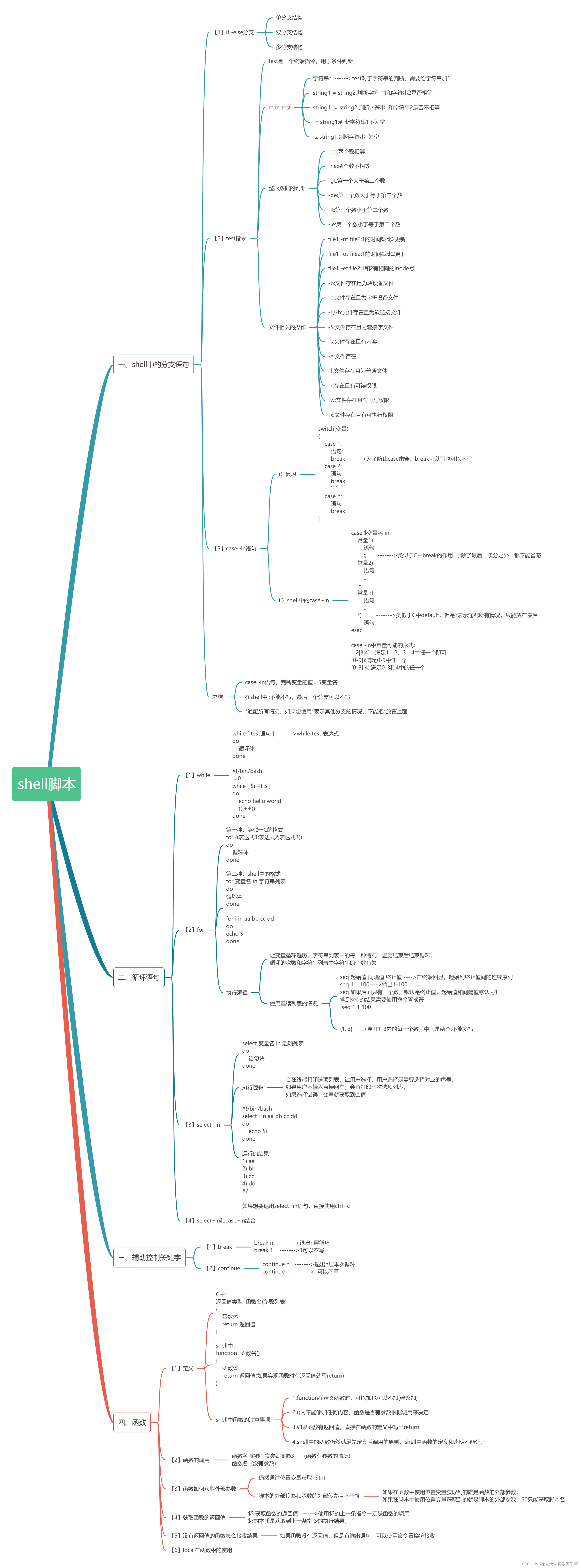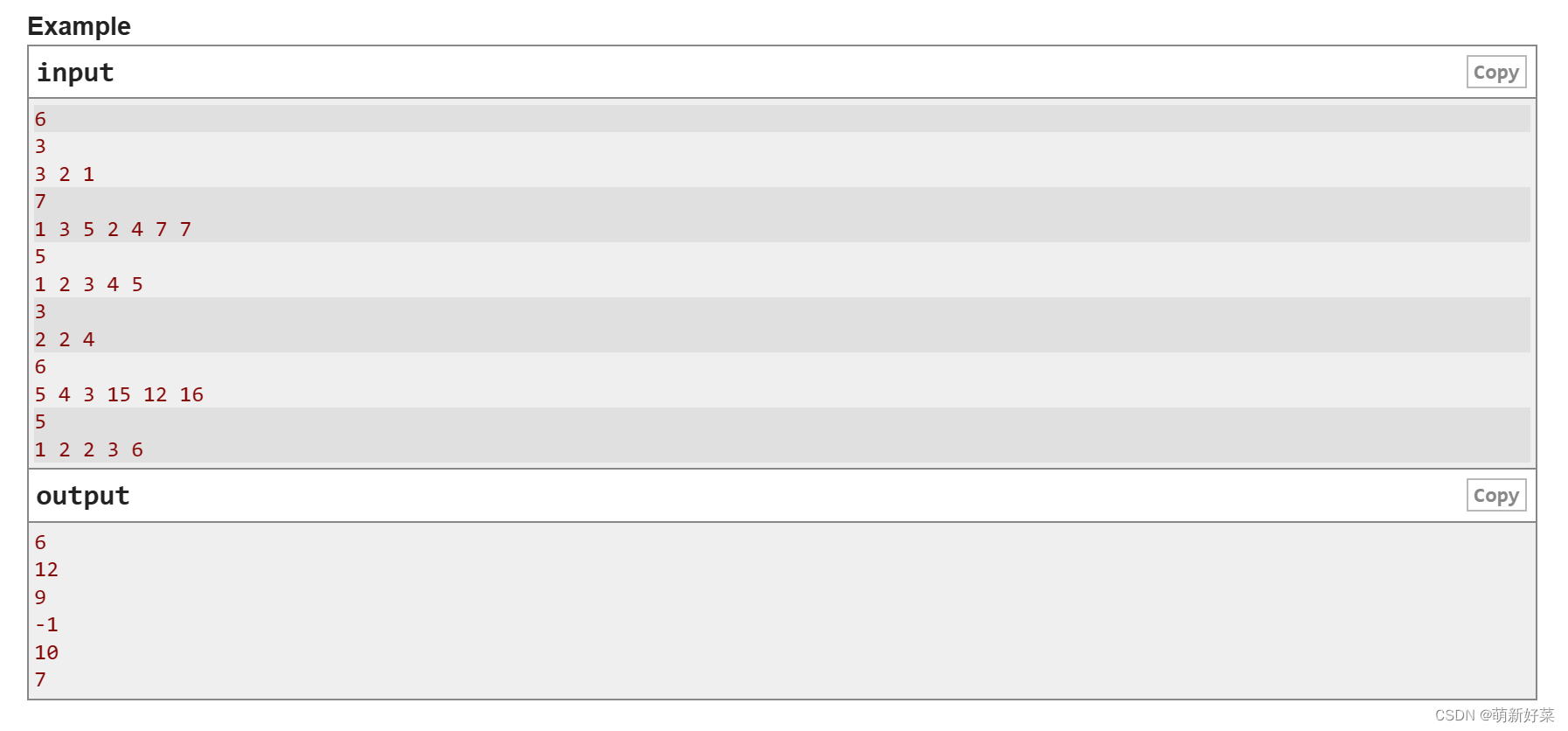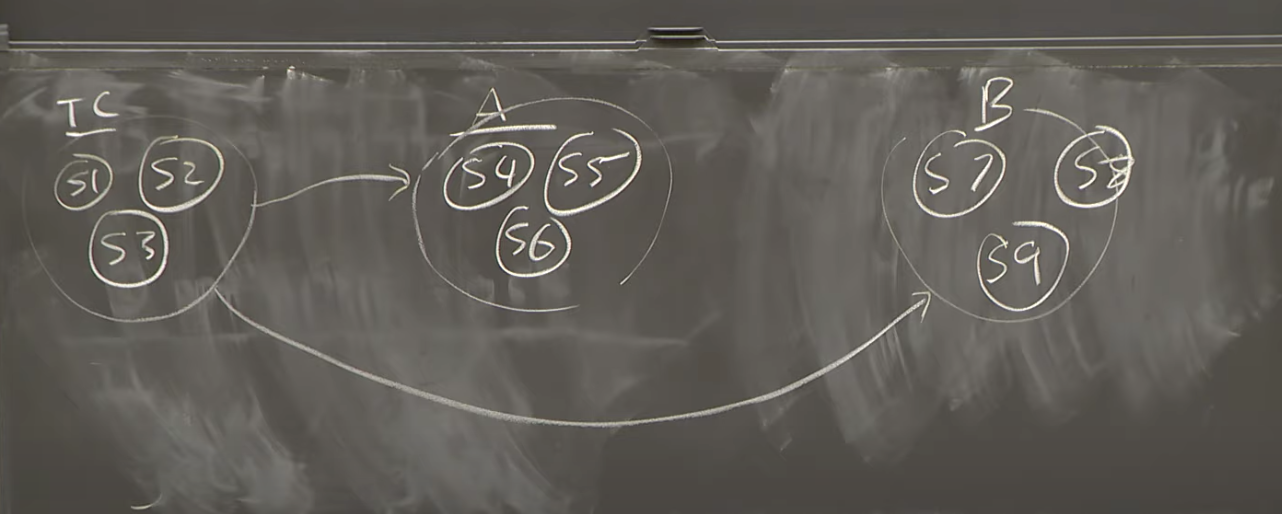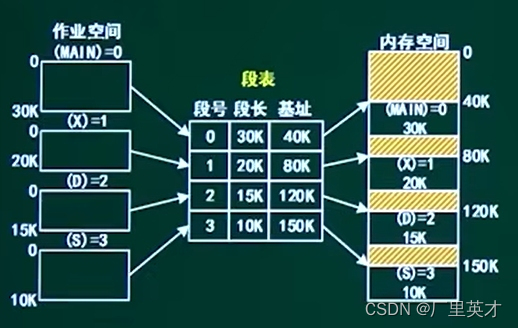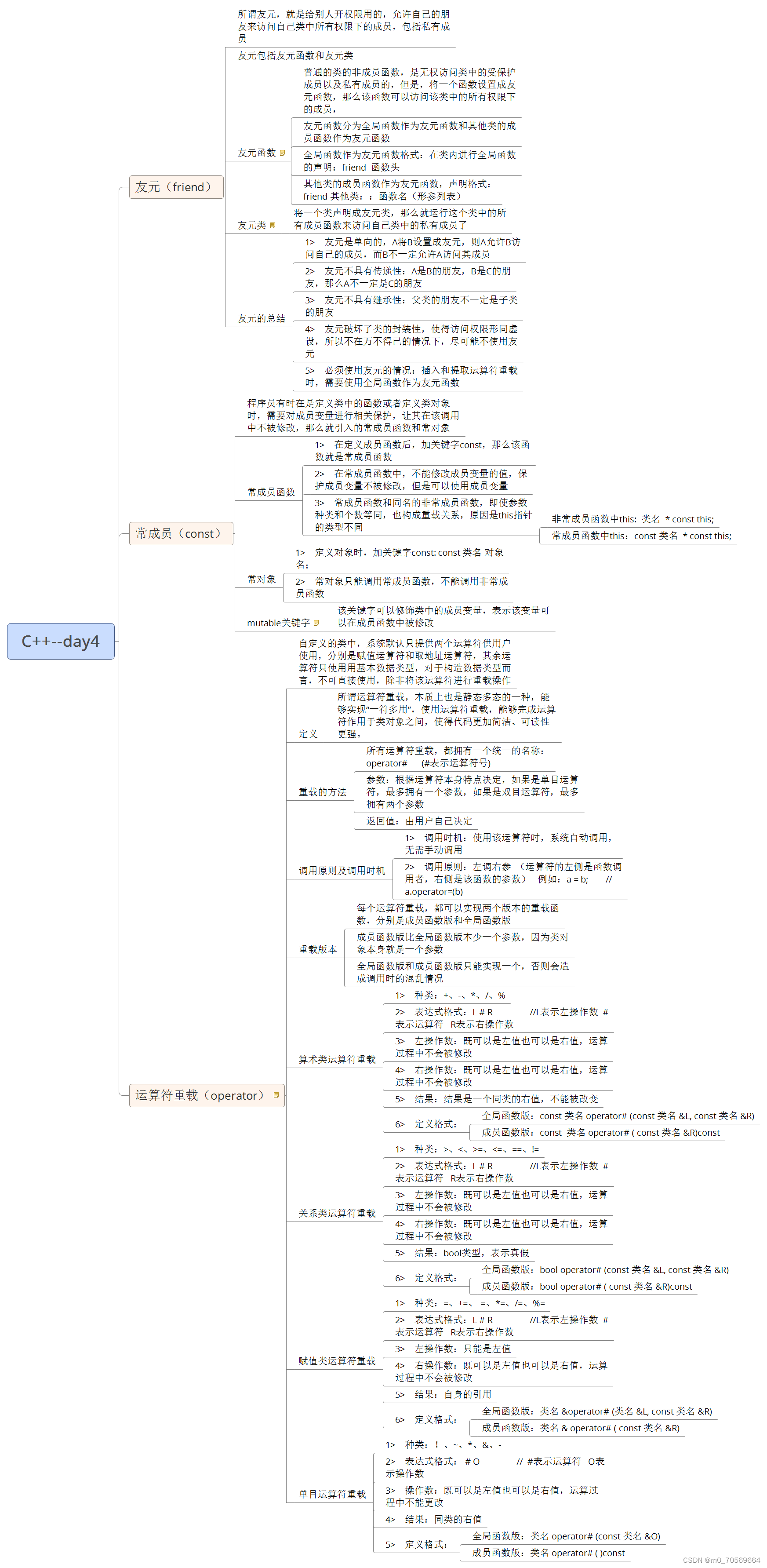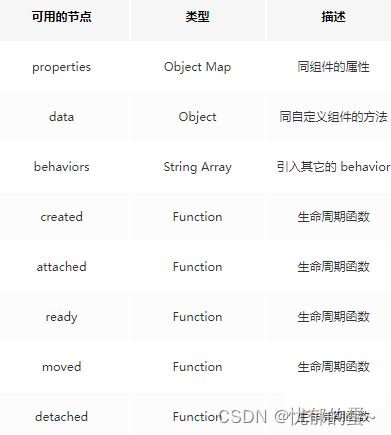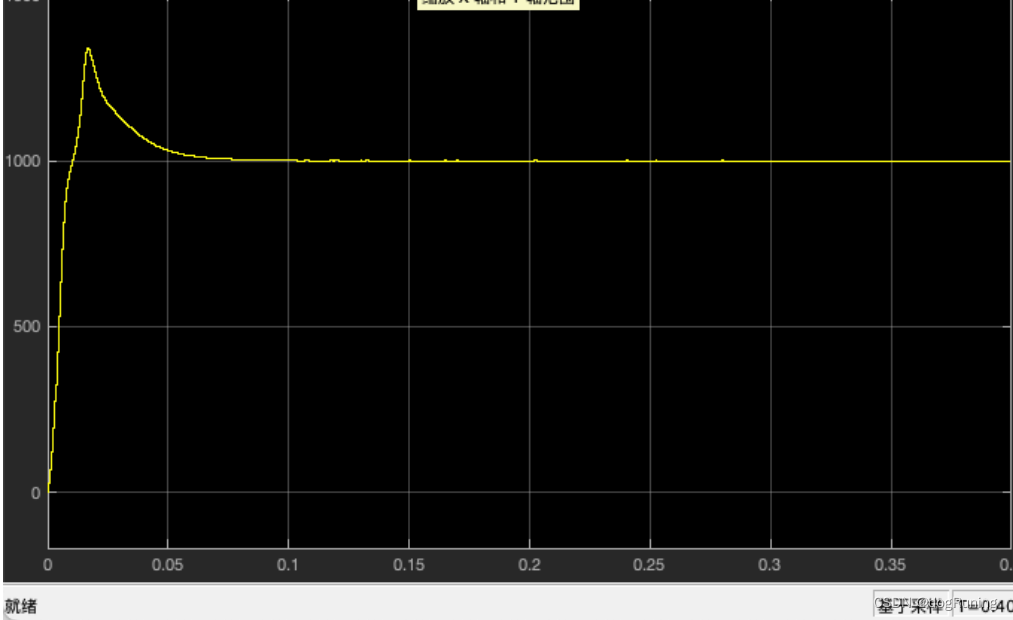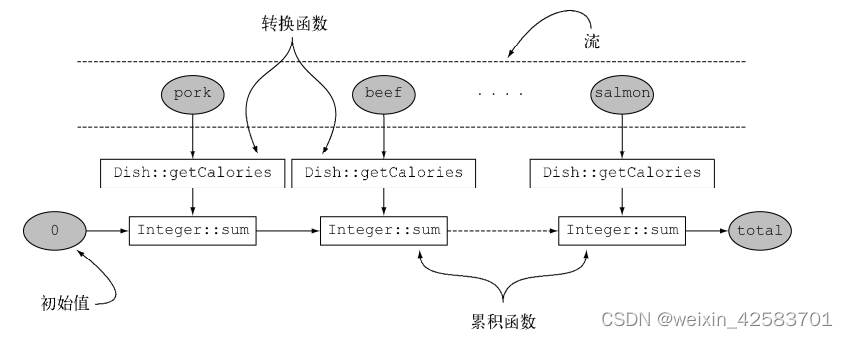文章目录
- 1.概念
- 2.操作
- 3.实现
- 3.1框架
- 3.2BSTree.h
- 3.3test.cpp
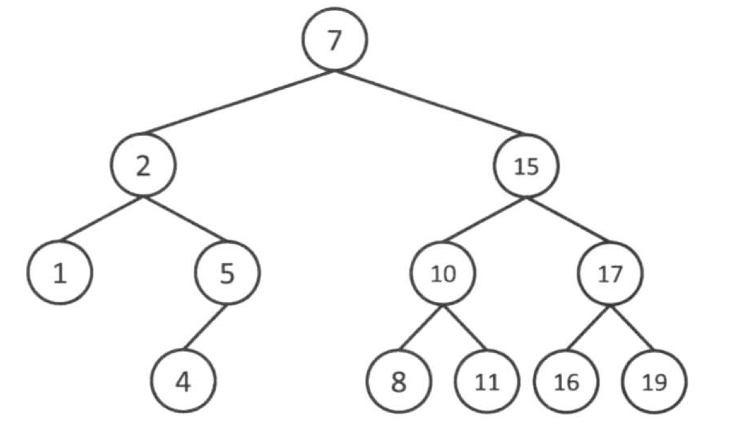
1.概念
二叉搜索树又称二叉排序树,它或者是一棵空树,或者是具有以下性质的二叉树:
若它的左子树不为空,则左子树上所有节点的值都小于根节点的值
若它的右子树不为空,则右子树上所有节点的值都大于根节点的值
它的左右子树也分别为二叉搜索树
2.操作
- 二叉搜索树的查找
a、从根开始,查找,比根大往右查,比根小往左查。
b、最多查找高度次,走到空还没找到,这个值不存在。 - 二叉搜索树的插入
插入的具体过程如下:
a. 树为空,新增节点,赋值给root指针
b. 树不空,查找插入位置,插入新节点
3.二叉搜索树的删除
查找元素是否在二叉搜索树中,不存在返回false。
存在:目标结点
a. 无子结点
b. 只有左子结点
c. 只有右子结点
d. 有左、右子结点
情况b:删除目标结点且使目标结点的父结点指向目标结点的左子结点–直接删除
情况c:删除目标结点且使目标结点的父结点指向目标结点的右子结点–直接删除
情况d:在目标结点的右子树中寻找中序下的第一个最小结点,用它的值填补到被删除节点中,再来处理该结点的删除问题–替换法删除
3.实现
3.1框架
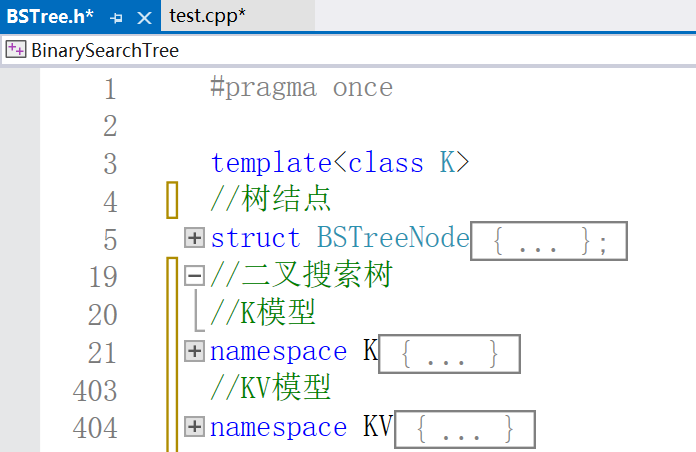
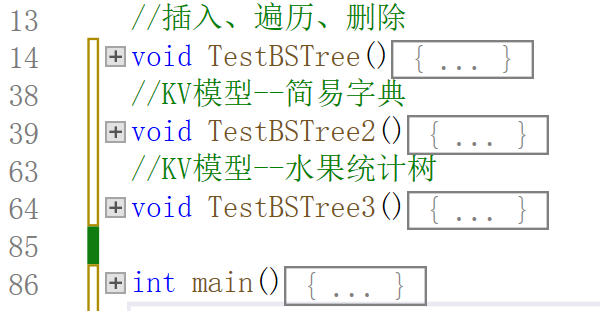
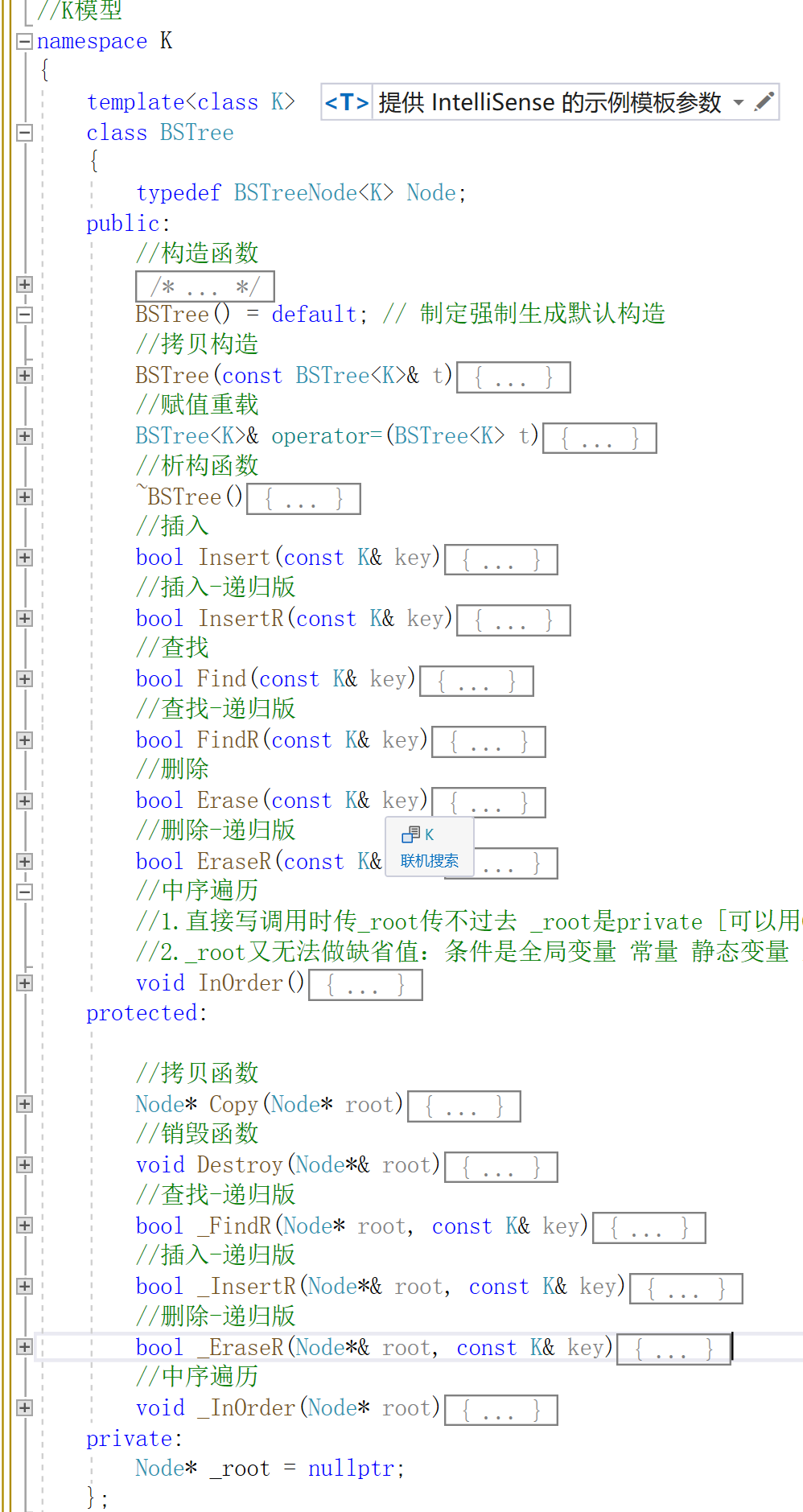
3.2BSTree.h
#pragma once
template<class K>
//树结点
struct BSTreeNode
{
BSTreeNode<K>* _left;
BSTreeNode<K>* _right;
K _key;
BSTreeNode(const K& key)
:_left(nullptr)
, _right(nullptr)
, _key(key)
{
}
};
//二叉搜索树
//K模型
namespace K
{
template<class K>
class BSTree
{
typedef BSTreeNode<K> Node;
public:
//构造函数
/*
BSTree()
:_root(nullptr)
{
}
*/
BSTree() = default; // 制定强制生成默认构造
//拷贝构造
BSTree(const BSTree<K>& t)
{
_root = Copy(t._root);
}
//赋值重载
BSTree<K>& operator=(BSTree<K> t)
{
swap(_root, t._root);
return *this;
}
//析构函数
~BSTree()
{
Destroy(_root);
}
//插入
bool Insert(const K& key)
{
//根值插入
if (_root == nullptr)
{
_root = new Node(key);
return true;
}
//定位合适位置
Node* parent = nullptr;
Node* cur = _root;
while (cur)
{
if (cur->_key < key)
{
parent = cur;
cur = cur->_right;
}
else if (cur->_key > key)
{
parent = cur;
cur = cur->_left;
}
else
{
return false;
}
}
cur = new Node(key);
//父子链接
if (parent->_key < key)
{
parent->_right = cur;
}
else
{
parent->_left = cur;
}
return true;
}
//插入-递归版
bool InsertR(const K& key)
{
return _InsertR(_root, key);
}
//查找
bool Find(const K& key)
{
Node* cur = _root;
while (cur)
{
if (cur->_key < key)
{
cur = cur->_right;
}
else if (cur->_key > key)
{
cur = cur->_left;
}
else
{
return true;
}
}
return false;
}
//查找-递归版
bool FindR(const K& key)
{
return _FindR(_root, key);
}
//删除
bool Erase(const K& key)
{
Node* cur = _root;
Node* parent = nullptr;
while (cur)
{
if (cur->_key < key)
{
parent = cur;
cur = cur->_right;
}
else if (cur->_key > key)
{
parent = cur;
cur = cur->_left;
}
// 找到目标结点--删除
else
{
// 1、左为空
if (cur->_left == nullptr)
{
//目标结点为根节点
if (cur == _root)
{
_root = cur->_right;
}
else
{
//目标结点为左结点
if (parent->_left == cur)
{
//父左接管目标右
parent->_left = cur->_right;
}
//目标结点为右结点
else
{
//父右接管目标右
parent->_right = cur->_right;
}
}
delete cur;
}
// 2、右为空
else if (cur->_right == nullptr)
{
//目标结点为根节点
if (cur == _root)
{
_root = cur->_left;
}
else
{
//父左接管目标左
if (parent->_left == cur)
{
parent->_left = cur->_left;
}
//父右接管目标左
else
{
parent->_right = cur->_left;
}
}
delete cur;
}
// 3、左右均有子结点
else
{
//找右树最小节点/左树最大节点
//一、右树最小节点
//obj只能是 只有右节点或叶子
//找obj【右树最小结点】
//Node* nannyDad = cur;
//Node* nanny = cur->_right;
//while (nanny->_left)
//{
// nannyDad = nanny;
// nanny = nanny->_left;
//}
赋值
//cur->_key = nanny->_key;
obj在父左 obj的右给父左
//if (nannyDad->_left == nanny)
//{
// nannyDad->_left = nanny->_right;
//}
obj在父右 obj的右给父右
//else
//{
// nannyDad->_right = nanny->_right;
//}
//delete nanny;
//二、左树最大结点
//obj只能是 只有左节点或叶子
//找obj【左树最大结点】
Node* nannyDad = cur;
Node* nanny = cur->_left;
while (nanny->_right)
{
nannyDad = nanny;
nanny = nanny->_right;
}
//赋值
cur->_key = nanny->_key;
//obj在父左 obj的右给父左
if (nannyDad->_left == nanny)
{
nannyDad->_left = nanny->_right;
}
//obj在父右 obj的右给父右
else
{
nannyDad->_right = nanny->_right;
}
delete nanny;
}
return true;
}
}
return false;
}
//删除-递归版
bool EraseR(const K& key)
{
return _EraseR(_root, key);
}
//中序遍历
//1.直接写调用时传_root传不过去 _root是private [可以用GetRoot()]
//2._root又无法做缺省值:条件是全局变量 常量 静态变量 且无this指针【this->_root】
void InOrder()
{
_InOrder(_root);
cout << endl;
}
protected:
//拷贝函数
Node* Copy(Node* root)
{
if (root == nullptr)
return nullptr;
Node* newRoot = new Node(root->_key);
newRoot->_left = Copy(root->_left);
newRoot->_right = Copy(root->_right);
return newRoot;
}
//销毁函数
void Destroy(Node*& root)
{
if (root == nullptr)
return;
Destroy(root->_left);
Destroy(root->_right);
delete root;
root = nullptr;
}
//查找-递归版
bool _FindR(Node* root, const K& key)
{
if (root == nullptr)
return false;
if (root->_key == key)
return true;
if (root->_key < key)
return _FindR(root->_right, key);
else
return _FindR(root->_left, key);
}
//插入-递归版
bool _InsertR(Node*& root, const K& key)
{
if (root == nullptr)
{
//引用传参 root是上层root的left或right 直接链接 yyds
root = new Node(key);
return true;
}
if (root->_key < key)
{
return _InsertR(root->_right, key);
}
else if (root->_key > key)
{
return _InsertR(root->_left, key);
}
else
{
return false;
}
}
//删除-递归版
bool _EraseR(Node*& root, const K& key)
{
if (root == nullptr)
return false;
if (root->_key < key)
{
return _EraseR(root->_right, key);
}
else if (root->_key > key)
{
return _EraseR(root->_left, key);
}
//相等--删除
else
{
//记录root
Node* obj = root;
//右为空
if (root->_right == nullptr)
{
root = root->_left; //实际是上层的root与当前层的root左链接 下同
}
//左为空
else if (root->_left == nullptr)
{
root = root->_right;
}
//左右都不空
else
{
Node* nanny = root->_left;
while (nanny->_right)
{
nanny = nanny->_right;
}
swap(root->_key, nanny->_key);
//将找到的nanny与obj交换 然后传新树递归删除obj
//【此时obj定为叶子节点-利用递归将删除一个有左右子结点的结点转换为删除一个叶子节点】
return _EraseR(root->_left, key);
}
delete obj;
return true;
}
}
//中序遍历
void _InOrder(Node* root)
{
if (root == nullptr)
return;
_InOrder(root->_left);
cout << root->_key << " ";
_InOrder(root->_right);
}
private:
Node* _root = nullptr;
};
}
//KV模型
namespace KV
{
template<class K, class V>
struct BSTreeNode
{
BSTreeNode<K, V>* _left;
BSTreeNode<K, V>* _right;
K _key;
V _value;
//构造函数
BSTreeNode(const K& key, const V& value)
:_left(nullptr)
, _right(nullptr)
, _key(key)
, _value(value)
{
}
};
template<class K, class V>
class BSTree
{
typedef BSTreeNode<K, V> Node;
public:
//插入
bool Insert(const K& key, const V& value)
{
if (_root == nullptr)
{
_root = new Node(key, value);
return true;
}
Node* parent = nullptr;
Node* cur = _root;
while (cur)
{
if (cur->_key < key)
{
parent = cur;
cur = cur->_right;
}
else if (cur->_key > key)
{
parent = cur;
cur = cur->_left;
}
else
{
return false;
}
}
cur = new Node(key, value);
// 链接
if (parent->_key < key)
{
parent->_right = cur;
}
else
{
parent->_left = cur;
}
return true;
}
//查找
Node* Find(const K& key)
{
Node* cur = _root;
while (cur)
{
if (cur->_key < key)
{
cur = cur->_right;
}
else if (cur->_key > key)
{
cur = cur->_left;
}
else
{
return cur;
}
}
return nullptr;
}
//删除
bool Erase(const K& key)
{
Node* cur = _root;
Node* parent = nullptr;
while (cur)
{
if (cur->_key < key)
{
parent = cur;
cur = cur->_right;
}
else if (cur->_key > key)
{
parent = cur;
cur = cur->_left;
}
// 找到目标结点--删除
else
{
// 1、左为空
if (cur->_left == nullptr)
{
//目标结点为根节点
if (cur == _root)
{
_root = cur->_right;
}
else
{
//目标结点为左结点
if (parent->_left == cur)
{
//父左接管目标右
parent->_left = cur->_right;
}
//目标结点为右结点
else
{
//父右接管目标右
parent->_right = cur->_right;
}
}
delete cur;
}
// 2、右为空
else if (cur->_right == nullptr)
{
//目标结点为根节点
if (cur == _root)
{
_root = cur->_left;
}
else
{
//父左接管目标左
if (parent->_left == cur)
{
parent->_left = cur->_left;
}
//父右接管目标左
else
{
parent->_right = cur->_left;
}
}
delete cur;
}
// 3、左右均有子结点
else
{
//找右树最小节点/左树最大节点
//一、右树最小节点
//obj只能是 只有右节点或叶子
//找obj【右树最小结点】
//Node* nannyDad = cur;
//Node* nanny = cur->_right;
//while (nanny->_left)
//{
// nannyDad = nanny;
// nanny = nanny->_left;
//}
赋值
//cur->_key = nanny->_key;
obj在父左 obj的右给父左
//if (nannyDad->_left == nanny)
//{
// nannyDad->_left = nanny->_right;
//}
obj在父右 obj的右给父右
//else
//{
// nannyDad->_right = nanny->_right;
//}
//delete nanny;
//二、左树最大结点
//obj只能是 只有左节点或叶子
//找obj【左树最大结点】
Node* nannyDad = cur;
Node* nanny = cur->_left;
while (nanny->_right)
{
nannyDad = nanny;
nanny = nanny->_right;
}
//赋值
cur->_key = nanny->_key;
//obj在父左 obj的右给父左
if (nannyDad->_left == nanny)
{
nannyDad->_left = nanny->_right;
}
//obj在父右 obj的右给父右
else
{
nannyDad->_right = nanny->_right;
}
delete nanny;
}
return true;
}
}
return false;
}
//中序遍历
void InOrder()
{
_InOrder(_root);
cout << endl;
}
protected:
//中序遍历
void _InOrder(Node* root)
{
if (root == nullptr)
return;
_InOrder(root->_left);
cout << root->_key << ":" << root->_value << endl;
_InOrder(root->_right);
}
private:
Node* _root = nullptr;
};
}
3.3test.cpp
#define _CRT_SECURE_NO_WARNINGS
#include <iostream>
#include <list>
#include <vector>
#include <algorithm>
#include <array>
#include <time.h>
#include <queue>
using namespace std;
#include "BSTree.h"
//插入、遍历、删除
void TestBSTree()
{
int a[] = { 8, 3, 1, 10, 6, 4, 7, 14, 13 };
K::BSTree<int> t1;
//插入建树
for (auto e : a)
{
t1.Insert(e);
}
t1.InOrder();
t1.Erase(4);
t1.InOrder();
t1.Erase(14);
t1.InOrder();
t1.Erase(3);
t1.InOrder();
t1.Erase(8);
t1.InOrder();
}
//KV模型--简易字典
void TestBSTree2()
{
KV::BSTree<string, string> Dictionary;
Dictionary.Insert("sort", "排序");
Dictionary.Insert("left", "左边");
Dictionary.Insert("right", "右边");
Dictionary.Insert("string", "字符串");
Dictionary.Insert("insert", "插入");
Dictionary.Insert("erase", "删除");
string str;
while (cin >> str)
{
auto ret = Dictionary.Find(str);
if (ret)
{
cout <<str << ":" << ret->_value << endl;
}
else
{
cout << "无此单词" << endl;
}
}
}
//KV模型--水果统计树
void TestBSTree3()
{
string arr[] = { "西瓜", "西瓜", "苹果", "西瓜", "苹果", "苹果", "西瓜", "苹果", "香蕉", "苹果", "香蕉", "梨" };
KV::BSTree<string, int> countTree;
for (auto str : arr)
{
//KV::BSTreeNode<string, int>*
auto ret = countTree.Find(str);
if (ret == nullptr)
{
countTree.Insert(str, 1);
}
else
{
ret->_value++;
}
}
countTree.InOrder();
}
int main()
{
TestBSTree3();
return 0;
}


